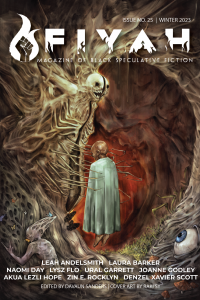Gabino Iglesias Reviews All Hallows by Christopher Golden
 All Hallows, Christopher Golden (Nightfire 978-1-25028-029-9, $17.99, 336pp, hc) January 2023.
All Hallows, Christopher Golden (Nightfire 978-1-25028-029-9, $17.99, 336pp, hc) January 2023.
Almost every horror lover I’ve ever met has a special place in their heart for Halloween, the one time of the year when everyone likes the same things we do and it’s okay to enjoy horror without having to explain yourself. Well, Christopher Golden’s All Hallows is the perfect novel for anyone who enjoys the horror, movies, candy, costumes, and shenanigans associated with October 31. A smart novel that gets to the hellish core of small-town America and a narrative that explores the many ways a family can crumble, this is also a great horror novel that packs a few secrets and plenty of supernatural horror.
It’s Halloween night in 1984 and the residents of Parmenter Road, a suburban street in Coventry, Massachusetts, are getting ready to go all out. They have candy, costumes, and parties, and Tony Barbosa and his daughter Chloe are almost done setting up their Haunted Woods, which has turned into a local attraction that is, sadly, on its last year. It should be a fun night, but there is a lot bubbling right under the surface and two families, the Barbosas and Sweeneys, will have their lives upended before the end of the night. Also, while the familial drama plays out, something much more dangerous is lurking in the neighborhood, something with a taste for blood that’s on the hunt for a few children that escaped its grasp.
All Hallows shows Golden, a great storyteller, at the top of his game. The first third of the novel isn’t horror per se. Instead, Golden spends a lot of time bringing readers into the world of Parmenter Road and giving them a deep look at the two families and a few other neighbors. The chapters in the book alternated between members of the Barbosa and Sweeney families and a young woman from the street named Vanessa Montez. Then, when things start going south and the supernatural mayhem starts, the cast of characters grows, and readers start seeing things from the perspectives of Ruth and – briefly – Zack Burgess, a couple of new neighbors with a shady past who are up to things much worse than the rumors that surround their recent arrival. While the shifting points of views and varying voices could’ve been a mess in less capable hands, Golden manages to juggle all the characters and the many problems they’re facing very well and without losing track of the supernatural darkness that permeates the narrative despite the many arguments, drama, infidelities, fights, financial troubles, and other suburban peccadilloes that fill the story.
All Hallows is a horror novel and a story about two families falling apart as well as a coming-of-age story that deals with moving away, the fear of change, and homosexuality. However, it is also a love letter to Halloween. The candy, horror movies, kids in costumes, and jovial mood that takes over entire neighborhoods during October 31 is present here, and it serves a perfect frame for the darkness that follows. Also, there are three characters, three kids no one knows, who enter the narrative at different times and change everything we think we know about where the story is going. And The Cunning Man comes with them. I could say more about The Cunning Man here, about his effect on children, the things he does in the woods, the impossible place he comes from, and the awful things he does in the woods, but those are treasures I refuse to spoil for others, so read the novel to find out more.
There’s a huge wave of nostalgia in fiction, and horror seems to have embraced it even more than other genres. Since the show Stranger Things became incredibly popular, I’ve come across a few narratives that take place in the ’80s for no reason other then to capitalize on that nostalgia. Here, however, it serves a variety of purposes. For starters, the depiction of small-town suburbia Golden brings to the page can be better shown in a story that takes place during a time when kids spent more time playing outside and neighbors talked a bit more to each other. Also, setting the novel in the ’80s takes cell phones out of the equation, and phones play a big role in a few chapters. Last, as a love letter to Halloween full of youngsters, All Hallows, which is not a YA book, benefits greatly from taking place during a time when a good percentage of its readers were kids, which helps readers relate to the characters and aids in the development of that much-needed empathy.
After novels like Road of Bones and Ararat, where the action takes place in remote places, All Hallows bring the horror, literally and metaphorically, to the backyard of suburban homes, and that makes it feel more immediate. Golden clearly loves all things horror, and this novel, his love letter to Halloween, shines with that love, and that makes it a lot of fun to read.
Gabino Iglesias is a writer, journalist, professor, and book reviewer living in Austin TX. He is the author of Zero Saints and Coyote Songs and the editor of Both Sides. His work has been nominated to the Bram Stoker and Locus Awards and won the Wonderland Book Award for Best Novel in 2019. His short stories have appeared in a plethora of anthologies and his non-fiction has appeared in the New York Times, the Los Angeles Times, and CrimeReads. His work has been published in five languages, optioned for film, and praised by authors as diverse as Roxane Gay, David Joy, Jerry Stahl, and Meg Gardiner. His reviews appear regularly in places like NPR, Publishers Weekly, the San Francisco Chronicle, Criminal Element, Mystery Tribune, Vol. 1 Brooklyn, the Los Angeles Review of Books, and other print and online venues. He’s been a juror for the Shirley Jackson Awards twice and has judged the PANK Big Book Contest, the Splatterpunk Awards, and the Newfound Prose Prize. He teaches creative writing at Southern New Hampshire University’s online MFA program. You can find him on Twitter at @Gabino_Iglesias.
This review and more like it in the April 2023 issue of Locus.
 While you are here, please take a moment to support Locus with a one-time or recurring donation. We rely on reader donations to keep the magazine and site going, and would like to keep the site paywall free, but WE NEED YOUR FINANCIAL SUPPORT to continue quality coverage of the science fiction and fantasy field.
While you are here, please take a moment to support Locus with a one-time or recurring donation. We rely on reader donations to keep the magazine and site going, and would like to keep the site paywall free, but WE NEED YOUR FINANCIAL SUPPORT to continue quality coverage of the science fiction and fantasy field.
©Locus Magazine. Copyrighted material may not be republished without permission of LSFF.






